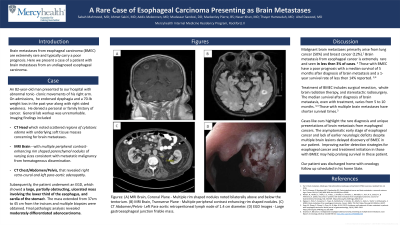Monday Poster Session
Category: Colon
P1684 - A Rare Case of Esophageal Carcinoma Presenting as Brain Metastases
Monday, October 23, 2023
10:30 AM - 4:15 PM PT
Location: Exhibit Hall

Has Audio

Sabah Mahmood, MD
MercyHealth
Loves Park, IL
Presenting Author(s)
Sabah Mahmood, MD, Mudassar Sandozi, DO, Ahmet Sakiri, MD, Naser Khan, MD, Thayer Hamoudah, MD, Altaf Dawood, MD, MBBS, Mackenley Pierre, , Addis Mekonnen, MD
MercyHealth, Rockford, IL
Introduction: Brain metastases from esophageal carcinoma are extremely rare and typically carry a poor prognosis. We present a case of a patient with cerebral metastasis with an unknown primary tumor that was subsequently diagnosed as esophageal carcinoma.
Case Description/Methods: An 82-year-old man presented to our hospital following an episode of abnormal tonic-clonic movements of his right arm. On exam, he had right-sided weakness and endorsed dysphagia and a 70-lb weight loss in the past year. The initial head CT noted scattered regions of cytotoxic edema with underlying soft tissue masses concerning for brain metastases. Further imaging with MRI-brain found multiple peripheral contrast-enhancing rim shaped parenchymal nodules of varying sizes consistent with metastatic malignancy from hematogenous dissemination. Workup to identify a primary malignancy included CT-chest/abdomen/pelvis that revealed right retrocrural and left para-aortic adenopathy. Subsequently, the patient underwent an EGD, which showed a large, partially obstructing, ulcerated mass involving the lower third of the esophagus, and cardia of the stomach. The mass extended from 37 cm to 45 cm from the incisors and multiple biopsies were obtained. The final pathologic analysis revealed moderately differentiated adenocarcinoma and the patient was discharged with oncology follow-up to start treatment.
Discussion: Metastatic esophageal cancer typically carries a poor prognosis and high mortality rate. The 5-year relative survival rate of people diagnosed with esophageal cancer is only 21% with worse rates seen in those with distant spread. The most common sites of esophageal carcinoma metastasis are to the lymph nodes, lung, liver, and bones, while the incidence of brain metastasis is rare and only seen in 1-3% of cases. Those with brain metastases from esophageal cancer typically have a poorer prognosis compared to patients with brain metastases from other solid tumors. The typical asymptomatic early stage of esophageal cancer and late presentation of neurologic symptoms with brain metastasis delay the discovery, diagnosis, and treatment of those with brain metastasis from esophageal cancer. Cases like ours highlight the need to improve diagnostic methods and increase research into esophageal cancer with cranial involvement in order to prolong survival for these patients.

Disclosures:
Sabah Mahmood, MD, Mudassar Sandozi, DO, Ahmet Sakiri, MD, Naser Khan, MD, Thayer Hamoudah, MD, Altaf Dawood, MD, MBBS, Mackenley Pierre, , Addis Mekonnen, MD. P1684 - A Rare Case of Esophageal Carcinoma Presenting as Brain Metastases, ACG 2023 Annual Scientific Meeting Abstracts. Vancouver, BC, Canada: American College of Gastroenterology.
MercyHealth, Rockford, IL
Introduction: Brain metastases from esophageal carcinoma are extremely rare and typically carry a poor prognosis. We present a case of a patient with cerebral metastasis with an unknown primary tumor that was subsequently diagnosed as esophageal carcinoma.
Case Description/Methods: An 82-year-old man presented to our hospital following an episode of abnormal tonic-clonic movements of his right arm. On exam, he had right-sided weakness and endorsed dysphagia and a 70-lb weight loss in the past year. The initial head CT noted scattered regions of cytotoxic edema with underlying soft tissue masses concerning for brain metastases. Further imaging with MRI-brain found multiple peripheral contrast-enhancing rim shaped parenchymal nodules of varying sizes consistent with metastatic malignancy from hematogenous dissemination. Workup to identify a primary malignancy included CT-chest/abdomen/pelvis that revealed right retrocrural and left para-aortic adenopathy. Subsequently, the patient underwent an EGD, which showed a large, partially obstructing, ulcerated mass involving the lower third of the esophagus, and cardia of the stomach. The mass extended from 37 cm to 45 cm from the incisors and multiple biopsies were obtained. The final pathologic analysis revealed moderately differentiated adenocarcinoma and the patient was discharged with oncology follow-up to start treatment.
Discussion: Metastatic esophageal cancer typically carries a poor prognosis and high mortality rate. The 5-year relative survival rate of people diagnosed with esophageal cancer is only 21% with worse rates seen in those with distant spread. The most common sites of esophageal carcinoma metastasis are to the lymph nodes, lung, liver, and bones, while the incidence of brain metastasis is rare and only seen in 1-3% of cases. Those with brain metastases from esophageal cancer typically have a poorer prognosis compared to patients with brain metastases from other solid tumors. The typical asymptomatic early stage of esophageal cancer and late presentation of neurologic symptoms with brain metastasis delay the discovery, diagnosis, and treatment of those with brain metastasis from esophageal cancer. Cases like ours highlight the need to improve diagnostic methods and increase research into esophageal cancer with cranial involvement in order to prolong survival for these patients.

Figure: (A) MRI Brain, Coronal Plane - Multiple rim-shaped nodules noted bilaterally above and below the tentorium.
(B) MRI Brain, Transverse Plane - Multiple peripheral contrast enhancing rim-shaped nodules.
(C) CT Abdomen/Pelvis- Left Para-aortic retroperitoneal lymph noded of 1.4 cm diameter.
(D) EGD - Large gastroesophageal junction friable mass.
(B) MRI Brain, Transverse Plane - Multiple peripheral contrast enhancing rim-shaped nodules.
(C) CT Abdomen/Pelvis- Left Para-aortic retroperitoneal lymph noded of 1.4 cm diameter.
(D) EGD - Large gastroesophageal junction friable mass.
Disclosures:
Sabah Mahmood indicated no relevant financial relationships.
Mudassar Sandozi indicated no relevant financial relationships.
Ahmet Sakiri indicated no relevant financial relationships.
Naser Khan indicated no relevant financial relationships.
Thayer Hamoudah indicated no relevant financial relationships.
Altaf Dawood indicated no relevant financial relationships.
Mackenley Pierre indicated no relevant financial relationships.
Addis Mekonnen indicated no relevant financial relationships.
Sabah Mahmood, MD, Mudassar Sandozi, DO, Ahmet Sakiri, MD, Naser Khan, MD, Thayer Hamoudah, MD, Altaf Dawood, MD, MBBS, Mackenley Pierre, , Addis Mekonnen, MD. P1684 - A Rare Case of Esophageal Carcinoma Presenting as Brain Metastases, ACG 2023 Annual Scientific Meeting Abstracts. Vancouver, BC, Canada: American College of Gastroenterology.
